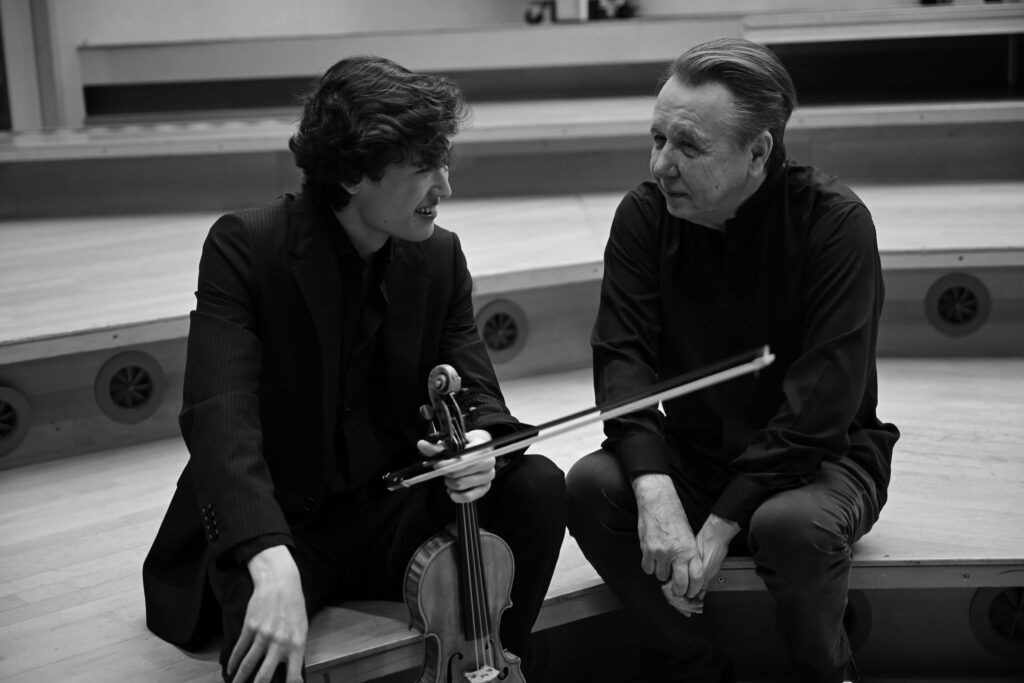On October 29th 2024, an extraordinary musical evening awaits as two of the most celebrated artists of our day come together for a spectacular concert at the Musikverein in Vienna. Mikhail Pletnev, the master pianist renowned for his storytelling through music, and Daniel Lozakovich, the prodigious violinist known for his inimitable musical talent, will perform together to present their newly-recorded CD under the Warner Classics label. This unforgettable performance promises to be a highlight of the musical season. Ahead of the concert, Lozakovich sat down for a short interview where he spoke about his relationship with Pletnev, his views on the programme and musical influences, and his thoughts about the upcoming event.
You’ve recently released a new album that brings together works by Edward Grieg, Dmitri Shostakovich, and Alexey Shor, in collaboration with pianist Mikhail Pletnev. For Mikhail Pletnev, this album marks his first CD of sonatas. How did your paths cross?
I first heard Mikhail Pletnev live at the Verbier Festival when I was just 13. Back then, I could never have imagined that one day I’d be playing alongside such a legend—a pianist who transcends his era and brings to mind the likes of Rachmaninoff, Horowitz, and Michelangeli. A few years later, Martin Engstroem, the director of the Verbier Festival, arranged for us to meet as a surprise for my birthday. I’ll never forget the incredible conversations we had that day.Soon afterward, Mikhail invited me to perform the Tchaikovsky Trio at a private concert at Martin’s house in Switzerland. From there, we began performing together frequently as a duo, and as a trio with Mischa Maisky, with Mikhail conducting. Over time, we developed a rare friendship built on shared passions and values. Aside from my teachers, Mikhail Pletnev is the musician who has taught me the most.
Alexey Shor, originally a mathematician, has now also found remarkable success as a composer. With Franck’s sonata and Grieg’s Third Sonata sharing a natural connection, since they were both written around the same time, how did you come to include Shor’s sonata in this album?
In our world of conflict and constant change, Alexey Shor‘s music feels like a ray of light. His work offers hope that it’s still possible to compose in a way that values beautiful melodies and that there’s an alternative to a strictly contemporary style. Shor’s music touches listeners deeply, like a glimmer of light. I had the opportunity to play one of his concertos under Mikhail’s direction, and he decided to work on a version of it as a sonata for violin and piano. This album felt like the perfect opportunity to introduce it to the public.Alexey Shor’s sonata is filled with intimacy and beauty, embodying a message of hope. I believe it’s essential to perform new music that resonates emotionally. Today, composing melodic works is rare, and with so many material distractions, it’s a real challenge. That’s part of what makes Shor’s music so valuable. Through this sonata, we want to inspire composers of all generations to keep the tradition alive and ensure that future generations don’t lose sight of it. We want to show that even those who come to music later, like Alexey Shor, can create meaningful works. To me, it’s important to believe that art is always possible if you love what you do.
Franck and Grieg are dear to me as well; their works convey such depth and emotion. This album reflects a balance—tradition, romance, and a touch of the modern.
You often mention Johann Sebastian Bach as a profound influence on you. Can you share a bit about what Bach means to you personally?Bach is very special to me. I try to play him every day because, for me, he’s the ultimate healer. As Sviatoslav Richter said, “Bach is good for hygiene”—I’d say, hygiene of the soul. When you play or listen to Bach, it feels like he clears away everything that disturbs you—disappointments, frustrations. Bach heals; he brings clarity and understanding.
Your first album was also centered on Bach, which many might consider a bold choice. Was that risky for you?
Absolutely! It was a challenge, but I wanted to convey something deeply authentic. Bach is like an x-ray for a musician—it reveals everything about you, both as an artist and as a person. His music strips you down to your core, making you search for purity, the divine qualities within the notes. I wanted to stay true to that.You’ve performed with some of the greatest conductors and orchestras. How does playing live compare to a studio recording for you?
The live setting brings a unique energy. There’s this aura from the audience, a sense of urgency and spirituality. Music, after all, is meant to be shared—it’s a triad between the composer, the performer, and the audience. They all need to connect on the same level.You’re often on tour, with a rigorous schedule. How do you handle the demands of such a lifestyle?
For me, music isn’t a job or a profession. It’s a way of life. Music is a language that connects us to something beyond, to each other’s souls. It makes you a better person, helps you understand life’s mysteries. I don’t focus much on the everyday challenges; I feel my role is to serve music, to make it my life’s purpose, almost like a sacrifice.
The CD launch concert will take place at the Musikverein in Vienna at 7:30 pm. Tickets can be purchased on the official website.
